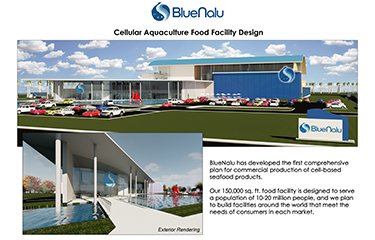Cellular seafood company BlueNalu unveiled plans to begin commercial production of cell-based finfish in five to seven years.
While other companies are testing development of cell-based seafood, this is the first time that a company has provided facility design schematics illustrating the vision for the large-scale production of foods via cellular agriculture or aquaculture, according to San Diego, California, U.S.A.-based BlueNalu.
BlueNalu’s five-phase commercialization strategy starts with research and development and small-scale pilot testing in two to three years, evolving to a phase that enables market research testing. Next, it plans to produce 150,000-square-foot food facilities that will produce up to 18 million pounds of finished seafood products per year.
Each production facility will look like a hybrid between a microbrewery and a conventional food production facility, BlueNalu President and CEO Lou Cooperhouse. The plants will produce an array of raw, cooked, fresh, and frozen seafood products – including value-added items – that are “prepared in a trusted and familiar way,” he told SeafoodSource.
“Proof of concept has been accomplished by this industry in the last five years, but proof of scale has not been proven yet,” Cooperhouse said.
Overall, the cell-based seafood industry is still in its infancy and includes players such as Singapore-based Shiok Meats, which recently received USD 4.6 million (EUR 4.1 million) in funding to develop its cell-based shrimp.
Another relatively new player is Avant Meats, which is initially focused on cell-based fish maw products.
“Fish maw is the swim bladder of fish and is a Chinese traditional tonic food. Pipeline direction will focus on Chinese aquatic delicacies,” the firm's co-founder and CEO, Carrie Chan, told Clean Technica.
BlueNalu is currently entering its first phase of development, producing whole seafood medallions and fillets at pilot-scale.
“Our first product is mahi,” Cooperhouse said. “We are also quite excited by Patagonian toothfish, Chilean sea bass, red snapper, and other species that command a premium value, that are scare or are on various watchlists.”
The company’s goal is to produce seafood from species that are overfished, primarily imported, contain higher levels of mercury and other environmental pollutants, and/or are difficult to farm-raise.
Rather than taking the place of wild fisheries or farm-raised products, BlueNalu aims to “create a third channel of supply,” Cooperhouse said. By focusing on difficult-to-farm raise and typically imported seafood, the company plans to supplement the seafood supply chain and not displace jobs in the traditional seafood industry, according to Cooperhouse.
Importantly, BlueNalu is utilizing cell-based technology, and not genetic engineering (GE), to produce its fish, Cooperhouse said.
“In the U.S., there is much more willingness to accept GE foods; it is much more of an issue in Asia and Europe,” he said. “We wanted to see if we can accomplish [production] without GE as the ultimate product application, and we were able to do so.”
So far, the approach appears to be working.
“We have recently developed stable fish muscle cell lines of multiple species, and accomplished this without using genetic engineering,” BlueNalu Chief Technology Officer Chris Dammann said in a press release. “This is critical, since large-scale production of seafood products will require a reliable and consistent supply of real fish muscle cells.”
The future BlueNalu facilities will each be designed to serve regional population centers, initially focused on serving countries in North America, Asia, and Europe, “where there is the greatest current and projected per capita consumption of seafood,” BlueNalu said.
“We are pleased that consumers world-wide are embracing alternative proteins,” Cooperhouse said. “BlueNalu is excited to announce that large-scale production of cell-based seafood is achievable in the near-term.”
Image courtesy of BlueNalu







